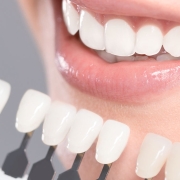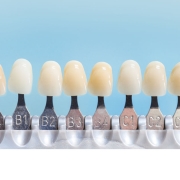Teeth that have been stained, worn down, chipped, discolored or in other ways damaged can cause embarrassment and personal discomfort. Some people with these problems find themselves afraid to smile while others struggle to make connections professionally or personally. If your teeth are functional but damaged, and you’d like to change their appearance, dental veneer services in Jacksonville FL can help.
For most people, dental veneers can be applied in one sitting, so patients leave the office with a smile that looks wholly different from the one they came in with. At Dr. Matt Henry in Jacksonville FL, we provide composite and porcelain veneer services to our patients. If you’re not sure whether dental veneers are right for you, make an appointment to learn more about our dental veneer services and how they could help improve your smile.
What Are Dental Veneers?
Dental veneers are shells that resemble natural teeth which are applied to the front of the tooth. They look like teeth, and they can bite and chew with teeth, but they don’t fit all the way around the tooth.
Composite Veneers
Composite veneers are created from a resin that looks very much like natural teeth. Composite veneers can be customized to match other teeth or can be custom made to whatever shade the patient prefers. They are relatively lightweight and feel very natural, which means they are not very noticeable once the patient adjusts.
Composite veneers do not match the shine of natural teeth as well as porcelain, and when exposed to dark-colored foods and drinks, composite veneers will stain. In addition, composite does not last as long porcelain and is more easily damaged than porcelain. Standard composite veneers typically last 5 to 7 years.
Porcelain Veneers
Porcelain veneers are a very popular option. While porcelain is a material that is easily chipped when it takes the form of a cup or dish, porcelain veneers are very strong once they’ve been affixed to tooth enamel. Porcelain veneers are highly stain resistant and look very much like natural teeth. They can last as long as 15 years.
One down-side to porcelain veneers? Once a veneer is damaged, it cannot be repaired. It must be replaced with an all-new veneer.
Are You A Good Candidate for Dental Veneers in Jacksonville, FL?
Veneers are a good option for people who only want to correct aesthetic challenges. Because veneers are designed only to fit over the front portion of the tooth, they do little to correct structural dental problems, or problems that affect the functionality of the tooth. Dental veneers can provide some protection for a damaged tooth, but they do not correct most dental problems.
If you dislike the way your teeth look but have few other problems with your teeth, then you may be a good candidate for dental veneers. The best way to find out if dental veneers are for you is to make an appointment with your dentist to discuss your goals.
You’re a good candidate for dental veneers if your teeth are:
- Stained
- Discolored
- Crooked
- Chipped
- Misshapen
How Are Dental Veneers Installed?
People who want veneers want a beautiful smile as quickly as possible. They love the rapid response they get from installing veneers, and the beautiful results. Unlike many other dental procedures, veneers are designed to make every tooth look great, no matter what issues might lie beneath.
The process for installing dental veneers varies, but for some patients, the process goes like this:
- Clean the teeth.
- Rough the surface of the tooth. This step is required for some veneers, but not for others. The process is irreversible and does require the tooth enamel itself to be ground down. For veneers that do not require the surface of the tooth to be roughed up in this way, some alteration to the tooth may be required, but in a way that is far less invasive.
- Apply adhesive.
- Install the veneers.
Veneers can be made in one of two ways. Porcelain veneers are modeled off of impressions of the patient’s teeth and created in a lab. The impressions allow porcelain veneers to be custom fit to each tooth.
Composite veneers can also be formed in a lab, but some composite veneers are formed through direct application to the patient’s teeth in the dental office. Either way, composite veneers start off as a fluid that is exposed to a special UV light which cures the resin until it is hardened into the correct shape.
Dental Veneers FAQ
What can damage a veneer?
Pen-biting, nail-biting and tooth grinding are all personal habits people can have that can damage their veneers. Eating hard foods like almonds can damage your veneers as well. If you have any of these habits, talk to your dentist before getting veneers installed. You may be able to protect your veneers with a night guard, if you grind your teeth.
Should I get porcelain or composite veneers?
This is a decision that you and your dentist should make together, based on factors that are specific to your circumstance. Talk to your dentist.
Is the veneer installation process painful?
The area will be numbed during the procedure, but some patients experience discomfort after the procedure is over. Your dentist can prescribe some pain medication to help.
Are veneers covered by insurance?
This depends entirely upon your insurance. You’ll have to call your dental insurance before the procedure to find out whether this type of procedure is covered and, if so, how much.
You’d Like Dental Veneers in Jacksonville, FL? Here’s How to Get Started
You deserve to have a smile that makes you feel confident. At Dr. Matt Henry, we’d be happy to help you determine whether dental veneers are right for you. To find out more, make an appointment to discuss veneers with Dr. Henry.




